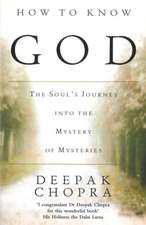Radical Grace: How Belief in a Benevolent God Benefits Our Health: Psychology, Religion, and Spirituality
Autor J. Harold Ellensen Limba Engleză Hardback – 29 oct 2007 – vârsta până la 17 ani
Din seria Psychology, Religion, and Spirituality
- 19%
 Preț: 318.78 lei
Preț: 318.78 lei - 18%
 Preț: 306.95 lei
Preț: 306.95 lei - 18%
 Preț: 355.85 lei
Preț: 355.85 lei - 38%
 Preț: 436.92 lei
Preț: 436.92 lei - 35%
 Preț: 362.06 lei
Preț: 362.06 lei - 18%
 Preț: 285.74 lei
Preț: 285.74 lei - 28%
 Preț: 360.89 lei
Preț: 360.89 lei - 18%
 Preț: 323.48 lei
Preț: 323.48 lei - 28%
 Preț: 360.81 lei
Preț: 360.81 lei - 31%
 Preț: 285.45 lei
Preț: 285.45 lei - 15%
 Preț: 306.67 lei
Preț: 306.67 lei - 31%
 Preț: 286.78 lei
Preț: 286.78 lei - 14%
 Preț: 358.45 lei
Preț: 358.45 lei - 34%
 Preț: 466.11 lei
Preț: 466.11 lei - 26%
 Preț: 305.72 lei
Preț: 305.72 lei -
 Preț: 350.67 lei
Preț: 350.67 lei - 14%
![Seeking the Sacred with Psychoactive Substances: Chemical Paths to Spirituality and to God [2 volumes]](https://i2.books-express.ro/bs/9781440830877/seeking-the-sacred-with-psychoactive-substances.jpg) Preț: 657.56 lei
Preț: 657.56 lei -

Preț: 354.25 lei
Preț vechi: 434.79 lei
-19% Nou
Puncte Express: 531
Preț estimativ în valută:
67.79€ • 71.70$ • 56.55£
67.79€ • 71.70$ • 56.55£
Carte tipărită la comandă
Livrare economică 31 decembrie 24 - 14 ianuarie 25
Preluare comenzi: 021 569.72.76
Specificații
ISBN-13: 9780313348167
ISBN-10: 0313348162
Pagini: 248
Dimensiuni: 156 x 235 x 25 mm
Greutate: 0.54 kg
Editura: Bloomsbury Publishing
Colecția Praeger
Seria Psychology, Religion, and Spirituality
Locul publicării:New York, United States
ISBN-10: 0313348162
Pagini: 248
Dimensiuni: 156 x 235 x 25 mm
Greutate: 0.54 kg
Editura: Bloomsbury Publishing
Colecția Praeger
Seria Psychology, Religion, and Spirituality
Locul publicării:New York, United States
Notă biografică
J. Harold Ellens is Philosophy and Psychology Professor Emeritus, Presbyterian Pastor and Theologian Emeritus, Founding Editor and Editor-in-Chief Emeritus of The Journal of Psychology and Christianity, Executive Director Emeritus of the Christian Association for Psychological Studies, and a retired US Army Colonel. He is Series Editor for the Praeger series in Psychology, Religion, and Spirituality. Among his 164 authored or edited volumes published are The Destructive Power of Religion, 4 volumes (Praeger, 2004 and condensed edition, 2007), Sex in the Bible (Praeger, 2006), and Psychology and the Bible, 4 volumes (Praeger, 2004).
Recenzii
Trained as a Bible scholar, having served as a Protestant military chaplain until retirement, and by now widely published, Ellens writes as a well-seasoned Christian theologian. His specialty is pastoral psychology and particularly the examination of its source material as found in religious and psychological theories about the nature of the person. From the point of view that he espouses and that he terms psychotheology, one's belief in a benevolent God rather than just any kind of God is likely to be a significant factor in maintaining a person's physical, emotional, mental, and spiritual health. Therefore, assumptions about the nature of God, along with appropriate models of human nature, go far toward determining one's ability to develop a healthy outlook and a healthful life. This book is the result of many years of service and reflection. Written in a clear and accessible style, it recalls earlier books by influential pioneers in the field such as James Dittes, Seward Hiltner, and Wayne Oates. It would be an ideal textbook or supplemental resource on faith and health for courses in church-affiliated colleges and Christian theological seminaries. Recommended. Lower-level undergraduates through graduate students, general readers, and practitioners.
In this impressive volume, J.H. Ellens gives us the culmination of his insights regarding the interface and mutual illumination of psychology and spirituality. This book is intended for a wide audience: undergraduate, and graduate students in psychology, theology, and spirituality; professors of psychology, religious studies, theology, and pastoral care; clergy and lay counselors; and simply the interested reader..Ellen's book has a different flavor in that it does not flinch from the destructive power of religion that is deeply ingrained in the structures of religious traditions..This book is recommended for all of Ellen's intended audience previously mentioned.
Ellens deserves much credit for superbly crafting a text which interestingly and informatively explores the challenging terrain at the interface of psychology, religion, and spirituality. Psychologists, psychiatrists, psychotherapists, clergy members, theologians, and pastors are among those who professionally may be edified very considerably by the masterful work of Ellens, as put to paper in this very fine book.
There is an extensive bibliography and index to facilitate the search for particular topics. Professors of theology, psychology and spirituality would find this volume useful as an integrated text or supplementary book for graduate students.
In this impressive volume, J.H. Ellens gives us the culmination of his insights regarding the interface and mutual illumination of psychology and spirituality. This book is intended for a wide audience: undergraduate, and graduate students in psychology, theology, and spirituality; professors of psychology, religious studies, theology, and pastoral care; clergy and lay counselors; and simply the interested reader..Ellen's book has a different flavor in that it does not flinch from the destructive power of religion that is deeply ingrained in the structures of religious traditions..This book is recommended for all of Ellen's intended audience previously mentioned.
Ellens deserves much credit for superbly crafting a text which interestingly and informatively explores the challenging terrain at the interface of psychology, religion, and spirituality. Psychologists, psychiatrists, psychotherapists, clergy members, theologians, and pastors are among those who professionally may be edified very considerably by the masterful work of Ellens, as put to paper in this very fine book.
There is an extensive bibliography and index to facilitate the search for particular topics. Professors of theology, psychology and spirituality would find this volume useful as an integrated text or supplementary book for graduate students.

















